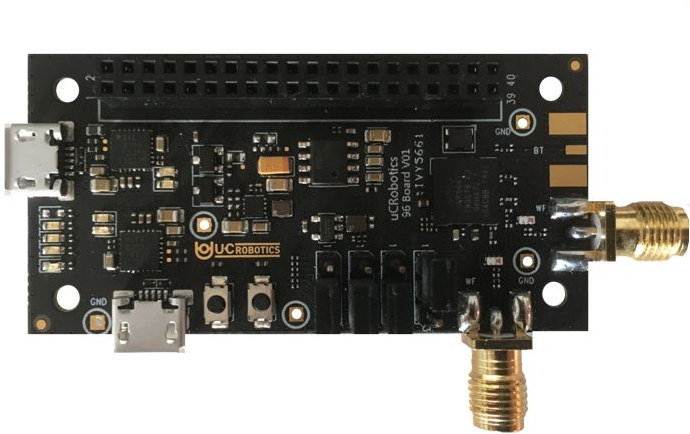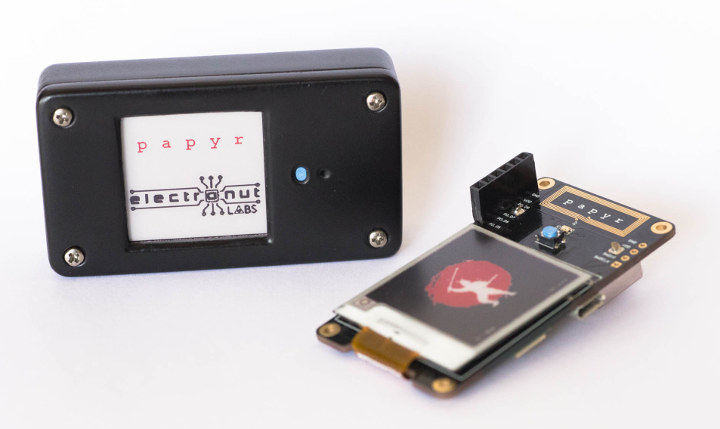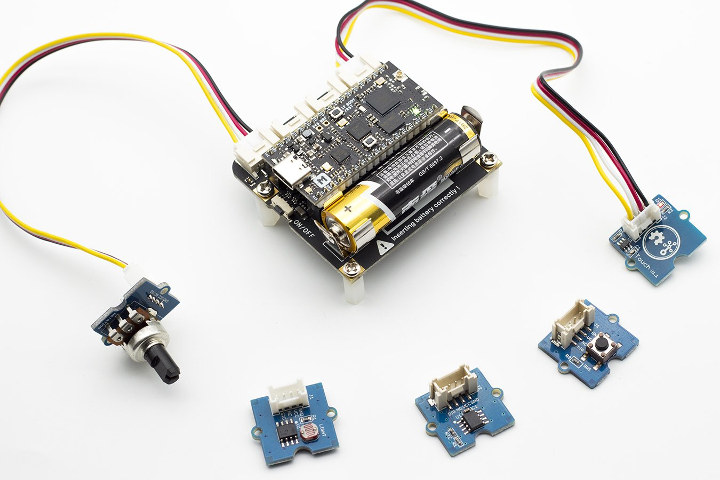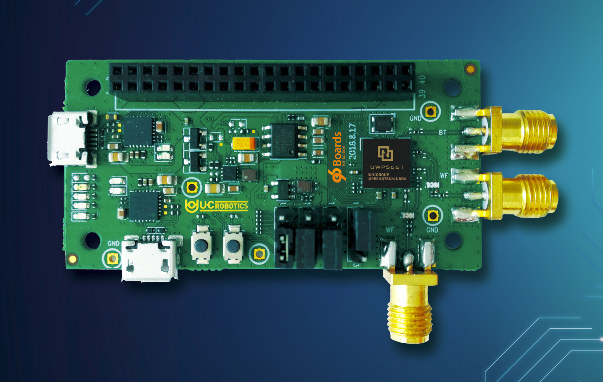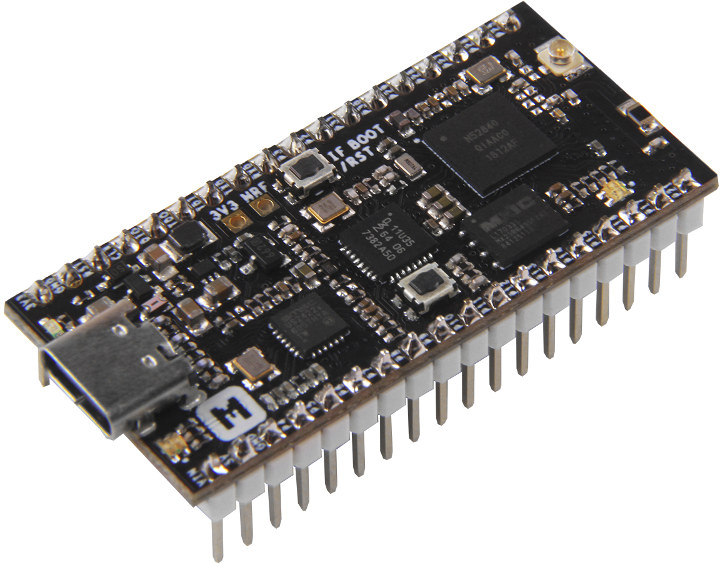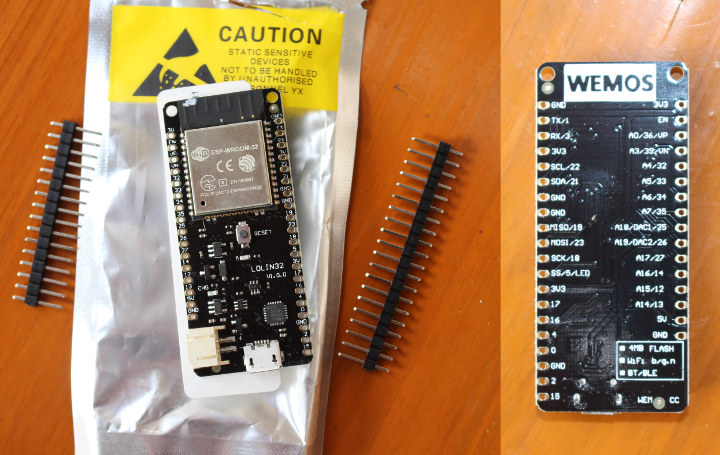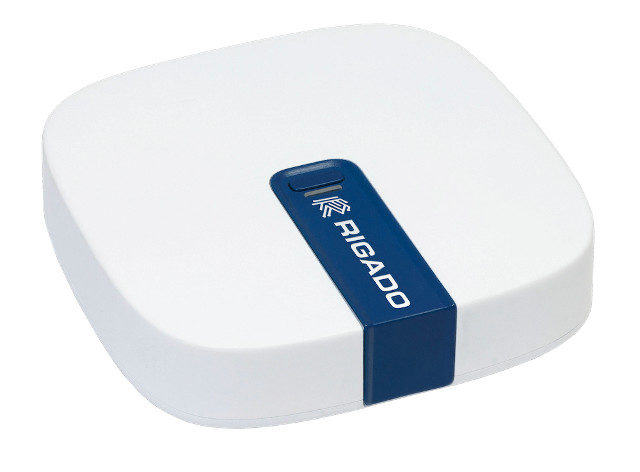There are many WiFi and/or Bluetooth board designed for the Internet of Things thanks to ESP8266 / ESP32, and other solutions, but usually they all work in the 2.4 GHz frequency band which can be an issue in crowded environments. Last October, we covered ucRobotics Ivy5661 96Boards compliant IoT board that offers a dual core Arm Cortex-M4F MCU with 802.11ac WiFi 5 and Bluetooth 5 connectivity. It was still under development at the time, but today, I’ve noticed it was listed on Seeed Studio for $35 with shipping scheduled for the end of February. ucRobotics Ivy5661 board specifications: SoC – UniSoC UWP5661 dual core Arm Cortex-M4 microcontroller @ 416 MHz manufactured with 28nm process Storage – 32Mbit NOR flash Connectivity (built in SoC) Dual band 802.11ac 2×2 MIMO WiFi 5 up to 866MHz; supports repeater mode, RTT indoor positioning Bluetooth 5 with support for high power mode, BT mesh, and […]
Papyr is a Nordic nRF52840 based Bluetooth/802.15.4 ePaper Display
Electronut Labs has designed a Nordic Semi nRF52840 boards featuring a black, red, and white e-Paper display. Papyr board supports both Bluetooth LE (BLE5, BLE Mesh) and 802.15.4 (Thread, Zigbee) connectivity, and can be controlled via an Android app, with iOS support coming later on. Papyr hardware specifications: Wireless Module – Raytac MDBT50 module with Nordic nRF52840 BLE/802.15.4 SoC (as used in Raytac MDBT50Q-RX Bluetooth 5 LE USB adapter) Connectivity – Bluetooth 5 LE/Mesh, 802.15.4 (Thread/Zigbee), NFC (PCB antenna) Display – 1.54″ 200×200 pixel red/black/white epaper display USB – 1x micro USB device port Expansion – Extra GPIOs via 2.54mm header Debugging – SWD Programming header Misc – RGB LED, push button, USB/Battery power switch Power Supply – 5V via USB, or CR2477 coin cell Dimensions – 65 x 35 mm You can control the board using Electronut Labs app for Android. Three features are supported at this stage: Draw, […]
nRF52840 MDK Base Dock Adds AA Battery Holder, Grove Connectors
Makerdiary nRF52840 Micro Development Kit (MDK) is a breadboard-friendly devkit for Nordic Semi nRF52840 multi-protocol wireless SoC that supports Bluetooth 5.0, Thread, IEEE 802.15.4, ANT, and 2.4GHz proprietary, and various popular frameworks or OS such as Arm Mbed OS, or the Zephyr Project. nRF52840 MDK Base Dock makes development just a little easier, by adding an AA battery holder, and four Grove connectors compatible with Seeed Studio’s Grove modules. nRF52840 MDK Base Dock specifications: Dual 2×18 Socket Headers compatible with nRF52832-MDK & nRF52840-MDK 4 Grove connectors with selectable UART/I2C/I2S/PDM/QDEC/SPI/ADC NFC tag-A PCB Antenna Power Power button with latching circuit AA battery holder Synchronous, Step-up Converter with VIN>VOUT Down Mode Operation 0.8V-to-4V Input Range 3.3V Output with Over-Current Protection Battery level sensing with 1:2 voltage divider on AIN2 Low power consumption: 5uA Shutdown Current; 145uA Idle Current Dimensions – 58mm x 54mm x 17mm The board also adds an NFC PCB […]
96Boards IoT Edition IVY5661 Board Features UniSoC UWP5661 WiFi 5 + Bluetooth 5 SoC
If you ever wanted to start a new IoT project with WiFi and Bluetooth connectivity, you’d like think about using Espressif ESP32 WiSoC that supports single band 802.11 b/g/n WiFi (WiFi 4) and Bluetooth 4.2 LE thanks to great community and software support on top of the ultra low cost of the solution. But in case your require 802.11ac (WiFI 5) – yes, I’m trying hard to get used to the new WiFi naming scheme for consumers -, or Bluetooth 5, Espressif Systems does not offer such solution yet. Instead you may consider UniSoC UWP5661 Arm Cortex-M4 WiSoC with WiFi 5 & Bluetooth 5 connectivity that will be found in the soon-to-be-launched UcRobotics IVY5661 96Boards IoT Edition board. I could not find lots of information about UWP5661 chip tself, so let’s jump directly to IVY5661 board specifications: SoC – UniSoC UWP5661 dual core Arm Cortex-M4 microcontroller @ 416 MHz manufactured […]
Embedded Linux Conference Europe & OpenIoT Summit Europe 2018 Schedule
The Embedded Linux Conference & OpenIoT Summit 2018 took place in March of this year in the US, but the European version of the events are now planned to take place on October 21-24 in Edinburg, UK, and the schedule has already been released. So let’s make a virtual schedule to find out more about some of interesting subjects that are covered at the conferences. The conference and summit really only officially start on Monday 22, but there are a few talks on Sunday afternoon too. Sunday, October 21 13:30 – 15:15 – Tutorial: Introduction to Quantum Computing Using Qiskit – Ali Javadi-Abhari, IBM Qiskit is a comprehensive open-source tool for quantum computation. From simple demonstrations of quantum mechanical effects to complicated algorithms for solving problems in AI and chemistry, Qiskit allows users to build and run programs on quantum computers of today. Qiskit is built with modularity and extensibility […]
Makerdiary nRF52840 Micro Development Kit Works with OpenThread, Arm Mbed OS, Zephyr OS, Mynewt, etc…
If you want to play around with Bluetooth 5, Nordic nRF52840 is probably one of the best option, and among the development board, $9/$12 Particle Xenon is hard to beat when it comes to value. But if you need a bit more storage, I/Os and features, Makerdiary nRF52840 micro development kit looks like a good candidate to evaluate, especially it supports plenty of frameworks / operating systems such as Arm Mbed OS, Zephyr Project, OpenThread, Mynewt, and others. It’s also the first MCU class board I’ve seen with a USB type C port, although I’m not sure it brings any benefits to this type of hardware. Makerdiary nRF52840 micro development kit (nRF52840-MDK) hardware specifications: SoC – Nordic nRF52840 Arm Cortex-M4F WiSoC with 1 MB FLASH and 256 kB RAM, Arm TrustZone Cryptocell 310 security subsystem External Storage – 64-Mbit QSPI flash Wireless Connectivity (on-chip) Bluetooth 5, Bluetooth Mesh Thread, IEEE […]
My Attempt at Getting Started with Zephyr Project OS on ESP32
Zephyr Project is a real-time operating systems for the Internet of Things (IoT) that was introduced in early 2016, and supported/hosted by the Linux Foundation. It runs on a fairly large number of MCU boards from different architecture (x86, Arm, RISC-V, etc..), and Linaro even launched 96boards IoT compliant hardware like BLE Carbon board that are designed to run Zephyr Project. More recently, Linaro CEO revealed several commercial products are shipping with Zephyr Project OS, so I thought it might be a good time to give it a try. Target Board – Wemos Lolin32 I only had STM32 Bluepill, and some ESP32 boards, so I went with the latter since it comes with WiFi. But instead of re-using some of my existing boards, I asked Banggood whether they could send Wemos Lolin32, which they did. They sell it for $7.99 shipped, but any other ESP32 board should do. The board […]
Rigado Vesta IoT Gateway Runs Linux and Zephyr OS, Supports Bluetooth 5, 802.15.4, WiFi, Ethernet and Cellular Connectivity
I’ve recently read several open source software news related to Rigado IoT gateway, starting with Canonical announcement last month, that the gateway would ship with Ubuntu Core starting in summer 2018, and a few days ago it popped up again during Linaro CEO keynote at Linaro Connect HK 2018, as one of the first commercial devices to run the Zephyr OS, specifically its fully open source Bluetooth stack on a Nordic nRF52 chip. Rigado Vesta IoT gateway is not exactly new, as it was first announced in December 2016. The hardware relies on an NXP i.MX 6UL Cortex A7 processor, up to 256MB RAM, 4GB eMMC flash, and includes built-in support for dual band WiFi, Bluetooth Smart, Bluetooth 5/4.2, 802.15.4 (Thread), Fast Ethernet with PoE, as well as optional support for a cellular LTE Cat 1 modem. Rigado gateway hardware specifications: Processor – NXP i.MX6 UltraLite (G3) Arm Cortex A7 […]


